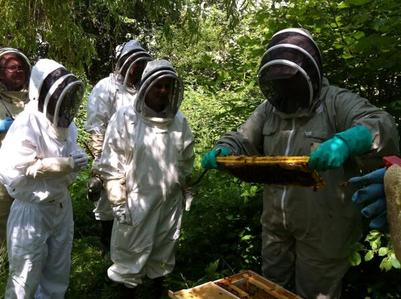
Interacting with bees makes humans:
1. Calm down. It didn’t seem this way at first. When us amateurs where putting on our protective suits for the first time there was definitely some nerves. But we had been told about the importance of keeping calm and relaxed while inspecting hives and so we tried out best. Interestingly, in informal conversations many of the beekeepers also talked about how they looked forward to doing their inspections because of how calm the whole process made them feel. So while we did have examples of humans trying to control their own moods, there was also a more relational understanding where the activity of the bees also encouraged particular responses in the humans
2. Become more attentive to whole ecosystems. One beekeeper discussed the way that since they had started, they noticed they were much more aware of the wider environment, including what trees and plants were being grown, whether they were flowering early or late, and cycles in the weather. Another also mentioned how important it is to be aware of the yearly rhythms of potential predators. So forging connections with bees seemed to have a knock on effect of building connections with a much wider variety of living creatures and plants.
3. Develop multiplying practices. One of the first comments at our workshop was the saying that if you put 10 bee-keepers in a room you’ll get 15 different ways of doing things. I thought it was really interesting that bees, which are often used as symbols of regimented order, actually inspire a proliferation of practices and knowledges in the humans that keep them.
4. More intelligent. In a Victorian-era book about encouraging bee-keeping amongst the poor, the author claimed that even while bee-keeping might not always be a success it should be encouraged because it makes people more intelligent.
5. Continuous learners. Paternalism aside, there were many comments about the way the practice of bee-keeping meant that you were always learning more and so always needed to be open to the ways that bees don’t fit with strict models.
6. Drink less alcohol Bees don’t like the smell apparently, so bee-keepers need to moderate their intake, particularly the night before they do an inspection. I wondered how this might affect people’s social lives. Would one have to beg off from a night at the pub because the bees needed looking after in the morning?
 RSS Feed
RSS Feed
